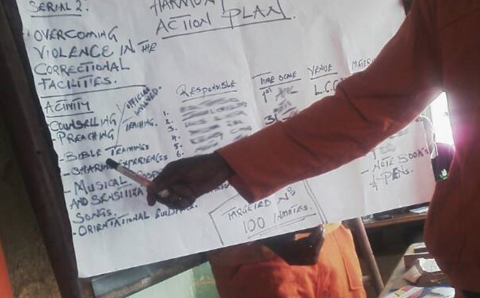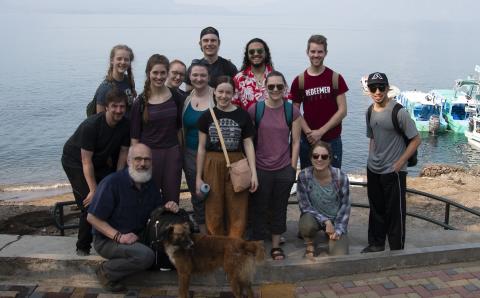The fallen leaves swirling along the avenue remind me that although it is warm enough to sit outdoors with my coffee on this October afternoon, winter is just around the corner. Looking up, I notice one leaf on an otherwise bare tree. One red leaf holding on, refusing to surrender to the expectations of the season. That leaf reminds me of Valentina.
Valentina came to Pilgrims Hospice after she was told she had about two weeks to live. It was not rational for her to think she would live long enough to see her sister’s baby due in several months or to celebrate her 30th birthday. But here’s what she did. She bought a new winter coat. Red. Expensive.
I remember wondering what I would do in that situation. Would I borrow a coat or shop at a thrift store? I probably wouldn’t even bother getting one. Valentina’s new coat had a profound impact on me. That coat was a symbol of Valentina’s faith in a future when everything looked so bleak. A sign of hope that she would live long enough to wear it during the approaching winter.
Poet Emily Dickinson described hope as “the thing with feathers—That perches in the soul—And sings the tune without the words—And never stops—At all.” I think Valentina might have described hope as the thing that lives in the soul and empowers you to buy a new winter coat even when you’ve been told you’re going to die before the first frost. But Valentina’s is more than a story of hope. It’s also a story about choice.
Valentina chose to live fully while she was alive. Facing imminent death, she continued to learn new things, taking painting lessons from a hospice volunteer. She enjoyed her simple meals. The beauty, smell, and taste of a single tomato gave her much pleasure. On days when her strength permitted, Valentina, the most seriously ill of the patients, would rise from her seat, greet the other patients attending the hospice day program, and welcome them with an encouraging word and often with an embrace.
Viktor Frankl, a psychoanalyst and a survivor of the Holocaust, has described how some individuals, even in the horror of a concentration camp, held on to a sense of choice. Although suffering and starving themselves, they walked through the huts comforting others, giving away their last piece of bread. Frankl writes, “They offer sufficient proof that everything can be taken from a man (or woman) but one thing: the last of the human freedoms—to choose one’s attitude in any set of circumstances, to choose one’s own way.”
Valentina could have become embittered, self-centered, and apathetic. She chose otherwise. She chose to bear her particular suffering with hope and courage and dignity. Her choice to buy a new red winter coat even when she had been told that she would die before winter was a way of acting heroically within a narrative of her own choosing. To rephrase Frankl, “The way Valentina bore her suffering was a genuine inner achievement. It is this spiritual freedom, which cannot be taken away, that makes life meaningful and purposeful.”
Valentina lived for two years, not two weeks. She wore her red coat for almost two winters. Her death, when it came, was grievous for all of us at the hospice, but especially for her young husband. As I finish my coffee, I’m aware that today it’s only gratitude I feel. Gratitude for having had the opportunity to bear witness to the life of such an incredible young woman. I will never forget her.
About the Author
A former nurse and chaplain, Janet Greidanus is a freelance news correspondent and long-time writer of the In Memoriam column for The Banner.








